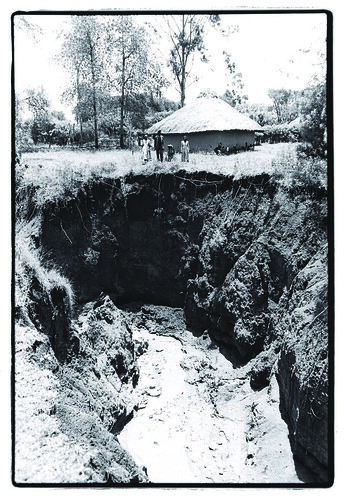Naomi Nyangancha, Jennifer Ojwang and their (common) husband stand in front of their homestead in the surreal landscape of Katuk Odeyo, which bears the brunt of extreme soil erosion in Nyando District, in Western Kenya (photo credit: ILRI/Mann).
Can we grow more food and feed more people and capture more carbon? 'Yes,' say those organizing an Agriculture and Rural Development Day held on 4 December 2010 in parallel with the Sixteenth Conference of the Parties (COP16) to the United Nations Framework Convention on Climate Change taking place at Cancún, Mexico.
Yes—if we support the small-scale producers and sellers of food and acknowledge that climate security and food security depend on each other. Read a report of the Agriculture and Rural Development Day at the 'CGIAR in Action' blog: Opening the door for agriculture at COP16,' 7 December 2010.
'Yes,' agrees Alex Perry, a journalist writing for Time Magazine this week (13 December 2010).
Yes—if we make green development work for the 7 out of 10 Africans living on small farms. 'Climate change is the mother of all negative externalities,' says Perry, who defines an 'externality' as a by-product of economic activity not included on the balance sheet.
'The problem is measuring it: How do you calculate the cost of climate change and then apportion it fairly among the world's businesses? Skeptics say rich governments and Big Industry can't or won't. Some, like Nicholas Stern, who produced the British government's Review of the Economics of Climate Change, say it can be done. But Stern's figures—which show that climate change could cut global gross domestic product by 20% if quick action is not taken—have been criticized as both over- and underestimates. And others argue that since climate change most affects the poor, programs to lift the developing world are the best way to fight its impact.
'But what if the externality could be accounted for, in a way that helped the poor? What if the economic rule book could be rewritten so that fighting climate change became development? . . . As a result of works by Sukhdev and others, UNEP [United Nations Environment Programme] executive director Achim Steiner can measure the financial benefits of saving the planet. New assessments indicate that "nature may represent between 50% and 90% of incomes in the developing world," he says. "In the past, these services have been invisible or near invisible in national and international accounts. This should and must change.". . .
'What is clear is the potential. "It is essential that climate change be viewed as a major development opportunity for Africa," World Bank managing director Ngozi Okonjo-Iweala said last year.
'And this is primarily a developing-world opportunity for two reasons. First, the poor world tends to be rich in things like forest and sunshine. Second, the rich world has few incentives to change its ways. "Suddenly there is the possibility of a whole new green trajectory for Africa," says UNEP spokesman Nick Nuttall. "You might ask, Can combatting climate change actually offer a new future for Africa?" . . .
'The question of whether green development becomes an African norm hinges on whether it works for companies and business leaders. That means Africa's farmers: 7 out of 10 Africans live on small farms. Unexpectedly, scientists are finding that it is those farmers who offer some of the best reasons for hope.'
Read the whole article at Time Magazine: Land of hope, 13 December 2010.

